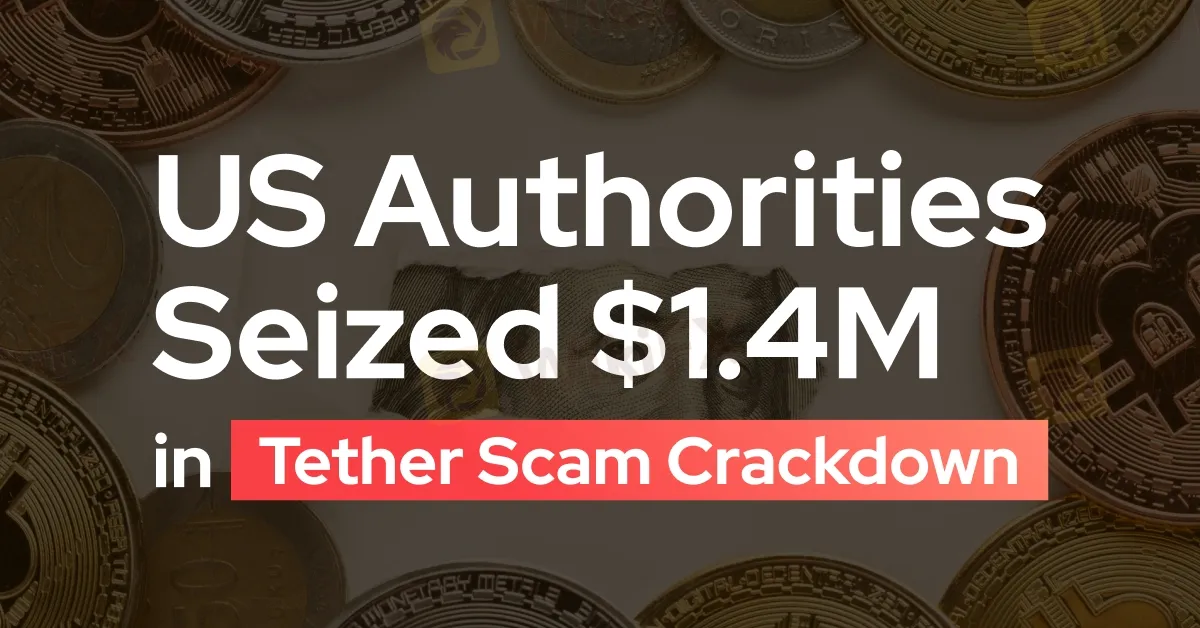简体中文
繁體中文
English
Pусский
日本語
ภาษาไทย
Tiếng Việt
Bahasa Indonesia
Español
हिन्दी
Filippiiniläinen
Français
Deutsch
Português
Türkçe
한국어
العربية
US Authorities Seized $1.4M in Tether Scam Crackdown
Abstract:In a decisive move against digital deception, U.S. authorities have seized $1.4 million in Tether (USDT) as part of a crackdown on a fraudulent customer support operation.

In a significant development, the U.S. Attorneys Office in Chicago, Illinois, has seized approximately $1.4 million in Tether (USDT) as part of a determined effort to dismantle a customer support scam operation. Executed on March 12, this move targeted funds suspected to have been fraudulently obtained, primarily affecting vulnerable elderly individuals.
The operation, spearheaded by the Department of Justice (DOJ) and the Federal Bureau of Investigation (FBI), received cooperation from Tether, a digital currency platform. The scam itself involved deceiving victims through deceptive popup advertisements, falsely asserting that their computers had been compromised.

Upon contacting the provided fake customer support number, victims were further misled into believing their bank accounts were in jeopardy. Subsequently, scammers, posing as support agents, persuaded victims to transfer their bank funds into USDT under the guise of safeguarding their assets, effectively seizing control of the victims tokens.
This case marks one of the initial instances in the United States of successfully retrieving USDT from an unhosted digital currency wallet. While the exact method of recovery remains undisclosed, an affidavit filed on January 24 suggests law enforcement was able to trace the stolen funds to five distinct wallets. These wallets were involved in a wire fraud scheme, with assets moved in small increments through intermediary addresses, likely as an attempt to launder the proceeds.
Despite Tether‘s operations being conducted outside U.S. jurisdiction, American regulators, particularly through the Office of Foreign Assets Control (OFAC), possess mechanisms to influence the stablecoin’s international operations.
A significant regulatory intervention involves Tethers association with Tornado Cash, a cryptocurrency mixer on the Ethereum network, which was sanctioned by OFAC in August 2022 for engaging in money laundering activities. This regulatory action highlights the ability of governmental bodies to indirectly impact tether usage through international cooperation and measures targeting affiliated entities.
Earlier in February, JPMorgan Chase suggested that impending stablecoin regulations could pose challenges for Tether. They argued that such regulations are likely to favour stablecoins offering greater transparency and adherence to emerging Know Your Customer (KYC) and Anti-Money Laundering (AML) standards, potentially affecting Tethers appeal. This regulatory shift could also impact the decentralized finance (DeFi) sector, where USDT plays a crucial role as collateral and liquidity.

Disclaimer:
The views in this article only represent the author's personal views, and do not constitute investment advice on this platform. This platform does not guarantee the accuracy, completeness and timeliness of the information in the article, and will not be liable for any loss caused by the use of or reliance on the information in the article.
Read more

Malaysian-Thai Fraud Syndicate Dismantled, Millions in Losses Reported
The Royal Malaysia Police (PDRM) has received 26 reports concerning the Nicshare and CommonApps investment schemes, both linked to a major fraudulent syndicate led by a Malaysian citizen. The syndicate’s activities came to light following the arrest of its leader by Thai authorities on 16 December.

Malaysia’s Crypto Landscape: Adapting Amidst Global Ambitions
The United States is intensifying its efforts to become a global cryptocurrency hub under President-elect Donald Trump. Experts believe this move could prompt countries, including Malaysia, to reassess their regulatory approaches toward digital assets.

SEC Approves Hashdex and Franklin Crypto ETFs on Nasdaq
The SEC has approved crypto index ETFs by Hashdex and Franklin Templeton, including Bitcoin and Ethereum, marking a milestone in crypto asset investment.

North Korean Hackers Steal $1.3bn in Cryptocurrency in 2024
Over $2.2bn in cryptocurrency stolen in 2024, with North Korean hackers accounting for $1.3bn. Discover how cyber theft impacts the evolving crypto landscape.
WikiFX Broker
Latest News
ASIC Sues Binance Australia Derivatives for Misclassifying Retail Clients
Top 10 Trading Indicators Every Forex Trader Should Know
WikiFX Review: Is FxPro Reliable?
Malaysian-Thai Fraud Syndicate Dismantled, Millions in Losses Reported
Trading frauds topped the list of scams in India- Report Reveals
WikiFX Review: Something You Need to Know About Markets4you
Revolut Leads UK Neobanks in the Digital Banking Revolution
Fusion Markets: Safe Choice or Scam to Avoid?
SEC Approves Hashdex and Franklin Crypto ETFs on Nasdaq
Malaysian Pensioner Loses RM823,000 in Fake Investment Scam
Currency Calculator


